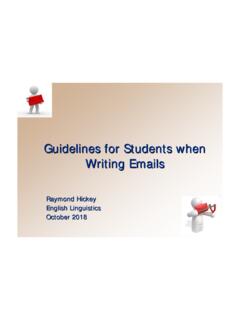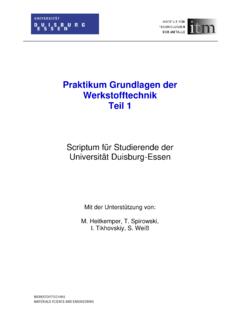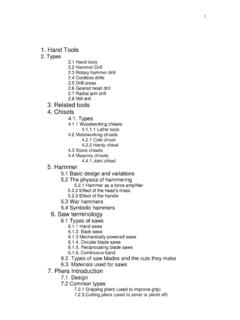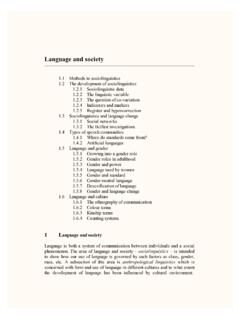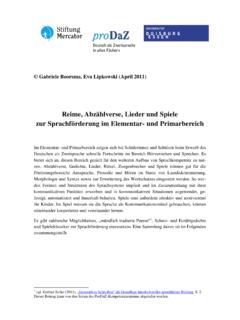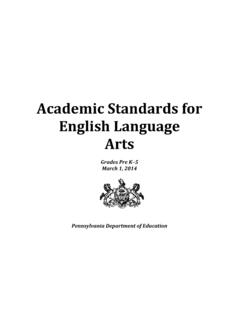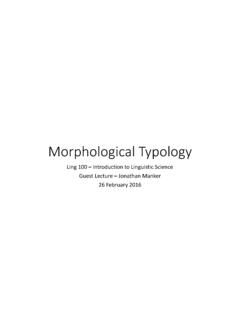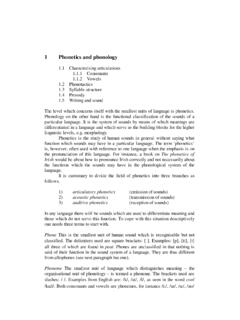Transcription of History of English Introduction - uni-due.de
1 History of EnglishHistory of English --a brief Introduction a brief Introduction --Raymond HickeyRaymond HickeyEnglish LinguisticsEnglish LinguisticsUniversity of Duisburg and EssenUniversity of Duisburg and EssenWhy should one take part in a seminar on The History of English ?Why should one take part in a seminar on The History of English ?1)In general, to find out about where English came from, how it developed and how it came to have its present form. This also includes learning about the relationship of English to its Germanic neighboursand to other European )Specifically, to learn more about the different linguistic levels of the English language in their historical dimensions. This includes the following )How was the spelling of English devised, what principles governed it originally?
2 This helps in trying to grasp the inconsistencies which have arisen in the five centuries since the orthography was developedand so helps one to remember spellings )How did the current pronunciation norm (Received Pronunciation) develop in England and how does it relate to vernacular forms ofEnglish, such as Cockney (the city dialect of London)?c)Why is the grammar of English the way it is? Why are there few endings compared to German and why is the syntax (use of prepositions or verbal forms) relatively )How did the vocabulary of English gain its present form? Why is there a stylistic division in the lexicon of the language with different layers corresponding to different degrees of formality?3)How have different varieties of English arisen outside of England?
3 What were the pathways along overseas forms of English developedin the colonial period?4)To learn about the techniques of historical linguistics, how does one reconstruct previous stages of a language, how does one compare languages, what assumptions are legitimate about diachronic stages of a )To understand more about the phenomenon of language change and ultimately to gain insights into the structure of language in general and how speakers use EnglishOld English Historical relationship of English and German Techniques of historical linguistics The coming of the English , divisions of Old English The structure of Old English Literature and society in the Old English period The Old English epic Beowulf The Scandinavian invasions and effects The Anglo-Saxon chronicleMiddle EnglishMiddle English The Anglo-Norman period.
4 Transition of Old to Middle English French influence on Middle English Spelling practice in Middle English The Great Vowel Shift and English pronunciation Literature during the Middle English period Religious writings in the Middle English period Mythology and literature in the Middle English period Private writing (family letters) in the Middle English period The age of Chaucer; Chaucer s major worksEarly Modern PeriodEarly Modern Period The Introduction of printing and English orthography English at the time of Shakespeare The Inkhorn Controversy and hard words Shakespeare s use of English The rise of the dictionary Views on English in the Augustan Age Grammatical prescriptivism in the 18th century The emergence of standard pronunciationViews of Language ChangeViews of Language Change Models of language change and the History of English Documents for English and reconstruction techniques Relative chronology in the History of English Language contact and the History of English Typological change and the History of English Grammaticalisationand the History of EnglishThe background to EnglishThe background to EnglishThis
5 Seminar will be concerned with the development of the English language from the earliest attestations and also considered the background to the language before the settlement of England by Germanic are three main divisions in the History of English and these were reflected in the presentations which were given during the term:Old English (450 to 1066)Middle English (1066 to 1500)Early Modern English (1500 onwards) The origins of EnglishThe origins of EnglishThemes in this period The Indo-European language family The Germanic languages, major sound changes Historical relationship of English to German The techniques of historical language studyInternal reconstructionComparative linguisticsOld English Old English (450(450--1066)1066)External History The coming of the Germanic tribes to England (c 450) The Christianisationof England (c 600) The Scandinavian invasions (c 800)Literature Epic literature.
6 Beowulf (c 800, manuscript from c 1000) Minor poetry (600 onwards) The Anglo-Saxon Chronicle (8th century onwards)Structure of language Sound system Grammatical system Vocabulary (Latin borrowings; Scandinavian borrowings)Middle English Middle English (1100(1100--1500)1500)External History The coming of the Anglo-Normans to England (1066) The break with France (1204) The Introduction of printing (1476)Literature Continuations of the Anglo-Saxon Chronicle Alliterative verse revival (14th century) Geoffrey Chaucer (1340-1399)Structure of language Sound system Grammatical system Vocabulary (Anglo-Norman and Central borrowings)Early Modern English Early Modern English (1500 onwards)(1500 onwards)External History The Renaissance in England (16th century and later) Development of overseas colonies (17th century and later) Transporationof English to the Caribbean, North American Civil war in England and later Restoration 18th century.
7 Transportation of English to overseas locations The development of prescriptive attitudes in 18th and 19th century EnglandLiterature 16th century writers The age of Shakespeare Restoration writers (drama) The Augustan age The rise of the novel (18th century) 19th centrypoetry and prose Journalistic literature from pamphlets to newspapersEarly Modern English Early Modern English (continued)(continued)Structure of language Sound systemThe Great Vowel Shift Grammatical system Vocabulary The Inkhorn Controversy Classical borrowings, Latin and Greek Later French loans, borrowings from otherlanguagesGroups of IndoGroups of Indo--European languagesEuropean languagesThe The Germanic Germanic languages languages todaytodayPeriods in the development of EnglishPeriods in the development of EnglishIt is common to divide the History of English into three periodsand old, a middle and an early modern one.
8 The justification for this is partly external and partly internal. The Old English period begins in the middle of the 5th century with the coming of Germanic tribes to settle in England. The Middle English period begins with the conquest of England by Normans after their success in the Battle of Hastingsin 1066, the end of this period is marked by the Introduction of printing by William Caxtonin 1476. The early modern period begins with the 16th century and is characterisedby an expansion in vocabulary by borrowing from classical languages, by the gradual conclusion ofthe Great Vowel Shift (see below) and by the regularisationof English grammar after the demise of the language's former inflectional morphology . Old EnglishOld EnglishEnglish has been spoken in England since around 450.
9 To be more precise a set of varieties of West Germanic have been spoken. After the Anglo-Saxon invasion no-one had an awareness of England as such let alone of English . With the establishment of the West Saxon kingdom in later centuries and with the court which formed the pivot point of this kingdom a first inkling of the idea of English developed. With the invasion of England by the Danes (after 800) it became more clear that the Germanic tribes in England were separate from their fellows on the Continent and inScandinavia. Among the different groupings in England in the OldEnglish period different dialects (that is purely geographical variants)are recognizable: Northumbrian in the north, Anglianin the middle and West-Saxon in the south. Due to the political significance of West-Saxon in the late Old English period (after the 9th century) the written formof this dialect developed into something like a standard.
10 Note that at this time it was Winchester and not London which was the political centre of the country. The term used for the West Saxon 'standard' is koin which derives from Greek and means a common dialect, that is a variety which was used in monastariesin parts of England outside of West Saxony for the purpose of dialects of Old EnglishThe dialects of Old EnglishIt is common to divide England into four dialect areas for the Old English period. First of all note that by England that part of mainland Britain is meant which does not include Scotland, Walesand Cornwall. These three areas were Celtic from the time of thearrival of the Celts some number of centuries BC and remained sowell into the Middle English period. The dialect areas of England can be traced back quite clearly tothe Germanic tribes which came and settled in Britain from the middle of the 5th century onwards.
